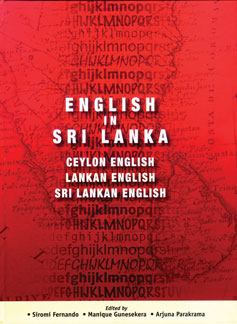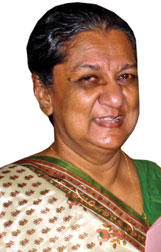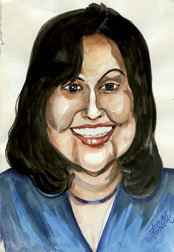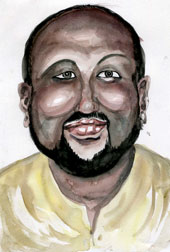|
A pedagogic survey :
Changing facets of English in Sri Lanka
By Ranga CHANDRARATHNE
 In the conclusion, Siromi Fernando states,
“There is inconsistency in the following rules in all the dialects.
There has also been sociological change in the description of the users
of the dialects. Apart from this, features of one dialect have begun to
occur in other dialects as well. Hence since there are some confused
patterns in the dialects at present, although the general
characteristics of each dialect can be described, it is difficult to
define clear rules. ” In the conclusion, Siromi Fernando states,
“There is inconsistency in the following rules in all the dialects.
There has also been sociological change in the description of the users
of the dialects. Apart from this, features of one dialect have begun to
occur in other dialects as well. Hence since there are some confused
patterns in the dialects at present, although the general
characteristics of each dialect can be described, it is difficult to
define clear rules. ”
Siromi Fernando’s contribution is noteworthy
given the fact that she has quite candidly explained the actual position
with regard to the existence of diverse varieties of Sri Lankan Standard
English and that a clear distinction can hardly be made among those
varieties.
The entire discourse on Sri Lankan English
or the homespun varieties of English raises pertinent issues such as for
whom these varieties of English developed, and how the distinct purpose
such varieties would serve particularly in the domain of international
relations and commerce. It is also highly polemical whether these
varieties of English are acceptable to the population at large and the
power wielders of the society. What is obvious is that such varieties of
English may contribute to the growing body of world Englishes and would
be of importance from pedagogic perspectives and perhaps, to maintain
English as a potent class indicator as stated by Thiru Kandiah.
The academic publication English in Sri Lanka,: Ceylon English,
Lankan English, Sri Lankan English is one of the seminal publications to
emerge from Sri Lankan academia on the evolution of English in Sri Lanka
and its myriads usages in diverse domains such as governance, education
and in day-to-day life.
The book, consisting of 21 papers, is edited by Prof. Siromi
Fernando, Prof. Manique Gunasekera and Prof. Arjuna Parakrama, and is a
publication by SLELTA (Sri Lanka English Language Teachers’
Association).
The primary motive of the book as stated in the introduction is to
‘provide documentary evidence of the existence of systemic and
rule-governed varieties of English in Sri Lanka, as well as to record
that the recognition and study of these varieties has a distinguished
disciplinary study. ” .
The publication offers, among other things, rich reference materials
for teachers, academics and the readers to identify and study diverse
varieties in Sri Lanka and their functionalities in different domains.
The book is divided into five sections under the titles, 1. History
and Development of English in Sri Lanka, 2. English: Education &
Literature, 3. Sri Lankan English Phonology, Morphology & Vocabulary, 4.
Language Choices, Functions & Policies and 5. Standards & Dialects of
Sri Lankan English.
Evolution of English in Sri Lanka

Prof. Siromi Fernando |

Prof. Manique Gunasekera |

Prof. Arjuna Parakrama |
In the essay entitled ‘Ceylon English’, H. A. Passe observes a
home-grown variety of English in Sri Lanka which he describes as ‘Ceylon
English’. This is, perhaps, one of the earliest instances of the
recognition of a variety of English other than British English which was
bequeathed to Sri Lanka during the British occupation of the island for
over 200 years.
Passe states, “ There has grown up in Ceylon a form of English with a
distinct flavour of its own in regard to pronunciation and intonation,
and in the case of most people, idiom, grammar, and vocabulary as well.
The explanation of this form of English would include the
investigation (i) of social and educational background of those who
taught English to the Ceylonese; (ii) of the extent to which the sounds
of Sinhalese and Tamil have influenced the pronunciation of Ceylon
English; (iii) of the prevalence of ‘translation errors’, i.e idiom and
grammatical usages imported from Sinhalese and Tamil into Ceylonese
English; (iv) of the extent to which words from the indigenous
languages, and from Indian languages and Portuguese and Dutch, are
commonly used in this form of English. ”
However, Passe observes there is ‘a negligible minority who for
special reason can speak and write Standard English’.
He observes different users of English , who use ‘a very mixed and
impure form of English’. The variety of English that he recommends is
the one ‘used by English-educated Ceylonese’. “ But there is a kind of
English used by English-educated Ceylonese, chiefly those in whose
families English has been used as the only or the first language for
several generations (including Burghers, Sinhalese and Tamils), in which
the sounds vary but slightly from those of Standard English –no more
than a northern-born educated Englishman’s might, in which the melodies
or tunes are not markedly different from those of Standard English, and
from which local idiom and grammar are practically absent.
This form of English is thus unobjectionable and can be taught,
provided there is a carefully selection and training of teachers in
modern methods of teaching English as a foreign language.”
It is interesting to note some of the translation errors that Passe
has pointed out in his paper may be still relevant to the contemporary
users of English in Sri Lanka.
“Cookwoman (Kussi amma) , In Ceylon, ‘cook’ is usually refers to a
male (Kokiya), and a female cook is designated cookwoman or cookie.
At this moment the cookwoman returned from the boutique. Columnist
In England, ‘cook’ is used for a person of either sex, but more often
refers to a woman, a male cook being a ‘chef’.
Junction (Handiya): cross roads
Boutiques, markets and small shops are usually to be found at a
‘junction’ or a meeting place of roads, in Ceylon. It is a centre of
life and activity to which people go to meet friends, to gossip, to buy
and sell. Hence one often hears, ‘You can get this at the junction’, ‘ I
am going to the junction for a few minutes ( mama handiyata tikak
gohilla enava)…
Man (Miniha)
In C.E. man is used colloquially in a sense similar to English ‘ my
dear fellow’, ‘I can tell you ’, ‘old fellow’. With the C. E. use maybe
compared with Eng. ‘man’ as an impatient or lively vocative’ ‘Nonsense,
man!’, ‘ Hurry up, man!’, ‘ Man alive’. ”
In as early as 1979, Doric de Souza has clearly identified the
‘Targets and Standards’ that Sri Lankans should adaopt considering
English from a utilitarian point of view. He concludes his paper
entitled ‘Targets and Standards’ making a pertinent point; “I ignore,
also, though I am wrong in doing so, the fact that English is a status
symbol in Sri Lanka and that it serves as a social barrier. This is
unfortunate but true.
..Here we must distinguish between the standards of written English
(of a utilitarian character as defined above) and spoken English.
Standards of English in utilitarian written English are uniform and
universal- I ignore the small variants in orthography, grammar, syntax
and vocabulary that occur with American English, because generally
speaking, a formal letter or a work of academic exposition can be read
without difficulty by people in anywhere in the English speaking world.
We should enforce the standards of written English without permitting
any local variants, which do not in fact occur in the fields I have
referred to.
Spoken English is another matter. Our English speaking elite in Sri
Lanka have evolved their own pronunciation which differs on one side
from British or American and from local “sub-standard” English. ”
English as a tool of power and potent class indicator
In his paper entitled “ Kaduva” : Power and the English Language
Weapon in Sri Lanka”, Prof. Thiru Kandiah, among other things, describes
the dominant attitude towards English entertained particularly by
Sinhalese and Tamils with a low degree of proficiency in English. For
them, English is not merely a language but a potent class weapon and
class indicator. At a time English speaking natives were branded as
‘English speaking classes.
Kandiah observes that although English is thought to be a second
language, for the “English speaking class it is the first language and
the power that it accompanied allowed them to fill the top positions in
the administration which has been a virtual heirloom for them, “… As
would be expected, therefore, whatever concessions may have been made to
the native languages in the country at large, the position of English
was jealously guarded at these higher levels.
No doubt, there was an immediate practical reason for this: the
bilingual elite who manned those higher level positions had always
carried on their activities in English, and they now found that they
could not perform at all effectively at these levels but in that
language.
The main factor was, however, power. It was the English language that
had raised these people to their position of power, and it was the
English language that, by separating them as a social class from the
rest of the people of the country, ensured that they would remain in
these positions to the exclusion of the latter.
The point is that since English functioned as something very
different from a utilitarian secondary language at these levels, as in
fact, a badge of privilege, the ordinary people, to whom English could
at best be nothing more than just a utilitarian second language but
something of a social accomplishment too had access to these levels.
This ensured, incidentally, that it would be they who would provide,
in a self-perpetuating manner, the personnel to fill the positions at
these levels.”
Privilege of language
Arjuna Parakrama’s paper entitled ‘Some thoughts on the language of
Privilege & the Privilege of Language’ represents the current discourse
on standards and de-hegemonising standards of English in Sri Lankan
academia.
Citing the largely failed year 11 English text book English Every Day
and some letters and answer scripts by students, Parakrama seeks to
propose his thesis that teachers or standard bearers should reverse
their privileged role.
He states; “ Here we come full cycle, then, to the point at which our
aim- as teachers of the standard bearers of the torch etc.- is to
destabilize, broaden this standard towards the creation of a situation
where the Rules and Tools are, in fact and not fiction.
Theirs (our students, the subaltern majority, the marginal, third
worlder, woman, worker). To learn (or rather unlearn) to read persistent
errors as resistance with our without demonstrable intention, and to
respect its radical difference. Ours was the privilege, as linguists,
teachers, codifiers, standard bearers and so on to confer the privilege
of language on these other Calibans so that their profit on’t was to
curse us in it.
Diverse domains
Let the roles be revered: Let us learn their (version of) language to
earn the right to the privilege of ours. Otherwise, we are simply acting
out the words of Wittgenstein: a crack is showing in the system, and
we’re trying to stuff it with straw, but to quieten our consciousness
that we’re using only the best straw. ”
One of the principal domains in which English is extensively used is
in the sphere of Higher Education and at universities. In the paper
entitled ‘English in the University’, E.F.C. Ludowyk explains in no
uncertain terms that the standard of English, particularly, of English
graduates produced by the system of Universities is ‘For those who wish
to read English standard can be no other than that demanded of the
undergraduate in English in any English or European University’.
However, Ludowyk admits that the standards of English can vary or as
he terms, ‘drop in the standards inevitable’. He observes, “In the
meantime with a drop in standards inevitable- standards in the level of
English attained by the candidates at the Preliminary examination- the
University may have to undertake courses of a general kind in the
reading and understanding of English for the benefit of all those who
wish to follow university courses.
For those who wish to read English the standard can be no other than
that demanded of the undergraduate in English in any English or European
University.
For him too, as for the rest, there will be need to study how words
behave and how our attitudes are influenced by their behaviour. Not in
the hope of twenty or thirty years ago when semantics was the new
“science” which was going to save the world, but with the chastened
feeling that if the way the world has been going in the last twenty five
years has taught university faculties anything, it should have made
clear that there is much to be said for the kind of education which
encourages a skeptical distrust of mass appeal in the name of race,
religion or even humanity.”
In a paper entitled “Influence of English on Sinhalese Literature”,
Martin Wickramasinghe, explores the overarching influence of English
literature and language on Sinhalese literature in general and on the
evolution of Sinhalese novel in particular.
Quoting Ananda Coomaraswamy, Wickramasinghe points out those
Sinhalese writers should derive inspiration from world literature
readily available in English and in turn enriching contemporary
Sinhalese literature rather than becoming mere admirers of Western
literature.
“The danger is not that the future Sinhalese writers will fail,
because of their narrow nationalism, to assimilate Western culture
through the medium of English; but that they will become lavish admirers
and imitators of Western literature instead of trying to seek
inspiration from every source and developing their own independent
creative genius.
This requires not nationalism but critical ability or insight to
probe the genuine core of Eastern and Western cultures. Beneath seeming
differences there is a core of unity in all cultures. Unless we develop
our critical insight to understand this core we are in danger of
becoming either narrow nationalists or superficial cosmopolitans.
….Says Ananda Coomaraswamy, “We must beware; for there are two
possible, and very different, contingencies that can follow from
cultural contacts of East and West.
Language without metaphor
One can , like Jawaharlal Nehru, and his own words, ‘become a queer
mixture of East and West, out of place everywhere, at home nowhere,’ or
being still oneself ‘in place’ anywhere, and ‘at home’ everywhere..in
the profoundest sense, a citizen of the world.”
One of the interesting and though provoking paper is ‘A language
without metaphor: A note on the English Language in Ceylon’ by Godfrey
Gunatilleke. Gunatilleke points out, among other things, that English in
Ceylon has limitations when it comes to describing authentic native
experiences or cannot be used as an all purpose language due to a lack
of metaphor to describe Sri Lankan experiences. He points out that in
Sri Lanka; English is a language without metaphor.
“It would be difficult to imagine vernaculars in Ceylon becoming as
lifeless and as thin as the English spoken by our English-educated
middle-class. In fact, the Sinhalese spoken by our middle-class is with
few exceptions very little different from its English. In the few
Sinhalese dramas produced by certain members of the Ceylon University
Staff, such as Kapuwa Kapothi, or Pabhavati, where an intelligent
response was expected, it is significant that the middle-class
situations chosen were naturally comic ones…the difficulty would arise
only if one attempts to use a contemporary colloquial idiom….The best we
can hope for is the ready commerce and interaction of the English of the
English-educated community and the vernacular, through an intelligent
bilingual community; that is , a group which could think in English and
the vernacular alike and bring into the natural stream of the vernacular
the attitudes and ways of thinking of the English-educated till the
terms of reference form a part of normal discourse.
Then the English spoken here would in turn benefit from such as close
association.” Though it is sad, this scenario has not yet happened in
Sri Lanka despite the fact English has been in use for over 200 years.
Standard of language
One of the cardinal issues that the contributors deal with in the
publication is ‘standard languages’ or ‘language standards’ besides
hegemonising and de-hegemonising different variants of English that are
in contemporary use.
Although Manique Gunesekera and Arjuna Parakrama identify one or two
main dialects of Standard Sri Lankan English, Siromi Fernando has
identified four dialects of Standard Sri Lankan English and that there
is overlapping of the characteristics of diverse dialects among one
another to such a degree virtually obliterating the clear distinction
among them.
Citing Einar Haugen’s seminal paper “ Dialect, Language, Nation”,
Siromi Fernando explains at length the notion of a standard of language;
Haugen has stated in defining standards,“ …a standard language, if it is
not be dismissed as dead, must have a body of users. Acceptance of the
norm, even by a small but an influential group, is part of the life of
the language. Any learning requires the expenditure of time and effort,
and it must somehow contribute to the wellbeing of the learners if they
are not to shirk their lessons.
A standard language that is the instrument of authority, such as
government, can offer its users material rewards in the form of power
and position…The kind of significance attributed to language in this
context has little to do with its value as an instrument of thought or
persuasion. It is primarily symbolic, a matter of prestige ( or lack of
it) that attaches to specific forms or varieties of language by virtue
of identifying the social status of their users..Mastery of the standard
language will naturally have a higher value if it admits one to the
councils of mighty …in our industrialised and democratic age there are
obvious reasons for the rapid spread of standard languages and for their
importance in the school system of every nation.”
In the conclusion, Siromi Fernando states, “There is inconsistency in
the following rules in all the dialects. There has also been
sociological change in the description of the users of the dialects.
Apart from this, features of one dialect have begun to occur in other
dialects as well.
Hence since there are some confused patterns in the dialects at
present, although the general characteristics of each dialect can be
described, it is difficult to define clear rules. ”
Siromi Fernando’s contribution is noteworthy given the fact that she
has quite candidly explained the actual position with regard to the
existence of diverse varieties of Sri Lankan Standard English and that a
clear distinction can hardly be made among those varieties.
The entire discourse on Sri Lankan English or the homespun varieties
of English raises pertinent issues such as for whom these varieties of
English developed and the distinct purpose for such varieties would
serve, particularly in the domain of international relations and
commerce. It is also highly polemical whether these varieties of English
are acceptable to the population at large and the power wielders of the
society. What is obvious is that such varieties of English may
contribute to the growing body of world Englishes and would be of
importance from pedagogic perspectives and perhaps, to maintain English
as a potent class indicator as stated by Thiru Kandiah.
What is striking is whether the ‘standard’ Sri Lankan varieties of
Englishes have fulfilled the requirements according to the classic
definition of ‘a standard language’ apart from their indefinable nature.
There has been an attempt to compile a bibliography on Sri Lankan
English.
|

